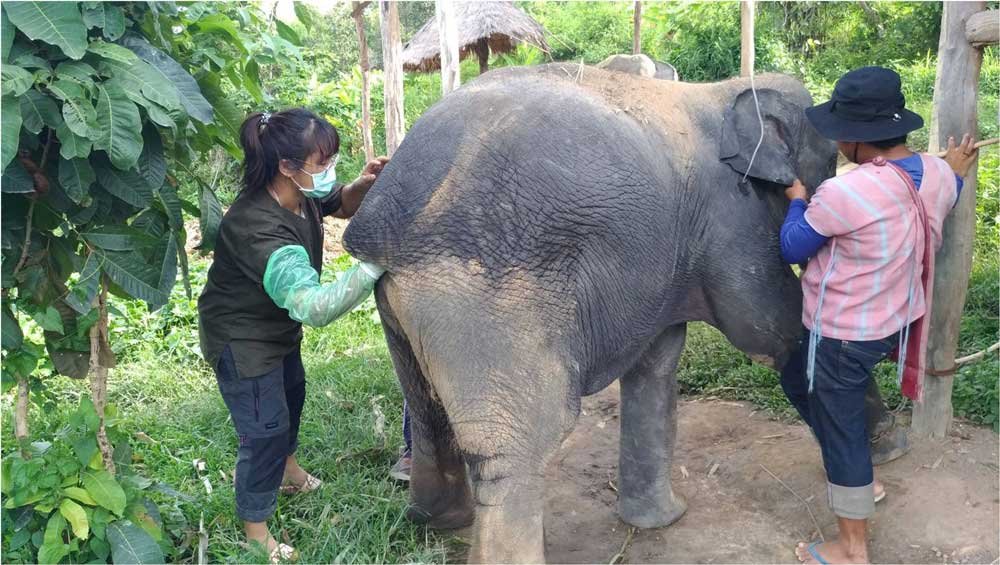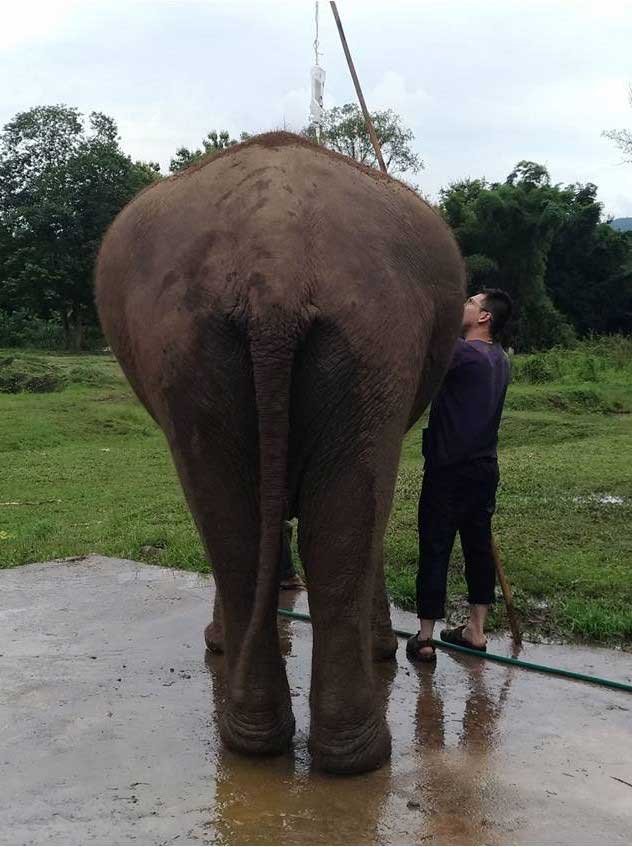The July Chiang Mai University Mobile Vet Clinic update comes to us for the first time from the new addition to the team, Dr. Pichamon Ueangpaibool, otherwise known as Dr. Eye, who we introduced you to in the July AES Newsletter. And she jumped right into her new role for sure. Dr. Eye spent the start of July in the Mae Wang district attending to many cases, from several gastrointestinal issues to a snake bite.
Along with the rest of the team making up the Mobile Vet Clinic, she treated an elephant calf that was suffering from diarrhea. When the call was made to the veterinary team, the owner said the calf had moist feces with parasites and was acting abnormally. Upon examination, they saw that the calf was lethargic but still eating and drinking. The calf was treated with activated charcoal, vitamin C and an anti-inflammatory. The veterinary team believes the illness could have been caused by eating soil, which elephants will do to rid themselves of parasites. However, a blood sample was also collected to conduct a PCR test for Elephant Endotheliotropic Herpesvirus (EEHV) as a precautionary measure. Results for EEHV were ultimately negative and the following day, the calf was acting better and eating and drinking more.
Next, Dr. Eye followed up on an older elephant who has had elbow abscesses that have been treated by the CMU team for several months, and which we have previously reported on. At this examination, the elbow abscesses were both decreased in size and found to have less discharge and dead tissue in them. The owners of the elephant were given additional medications to help continue treatment.
The following two cases were for a calf and an adult female suffering from colic or gastrointestinal distress. The elephants had swollen bellies and were treated similarly - with anti-inflammatory medications, gas-relieving drugs and fluid therapy. Both animals recovered the following day, passing gas and acting more normal.
Treatment for colic may include medications, enema and fluids, as in the case of this young calf (image above)
After the colicing animals were treated, the team was called to an urgent case by an elephant owner who suspected his elephant was bitten on the trunk by a snake. The elephant was acting normally, however her trunk had a wound on it that was swollen and hot. The recommended action normally would be to take the elephant to the hospital, however with the elephant acting and looking normal, the veterinarian decided to treat it with an antihistamine and anti-inflammatory medications. The elephant was fully recovered the following day.
At the end of the month, Dr. Eye collaborated with the Thai Elephant Conservation Center (TECC) when an aging elephant was admitted to the Kasetsart University’s Wildlife Unit for an potential obstruction inside the elephant’s throat. Clogged food was removed but there still was no improvement, the elephant was still not swallowing. The teams sedated the elephant to do an endoscopy and oral exam. Unfortunately the procedure was not successful due to the elephant’s generally poor health. Before any further procedures the veterinary teams will be working to stabilize the elephants health. We hope to provide an update on this case next month.
Elephant with suspected obstruction under the care of the veterinary teams from the Chiang Mai University Mobile Vet Clinic and the Thai Elephant Conservation Center at their hospital in Lampang, Thailand
We appreciate and look forward to more updates from Dr. Eye as the year rolls on. If you would like to show Dr. Eye and the rest of the CMU Mobile Vet Clinic your continuing support, we ask you to visit www.asianelephantsupport.org/donate and become a monthly donor. Your monthly donations allow Asian Elephant Support to send the critical funds necessary to veterinarians and elephant caregivers across Asia - especially for emergency requests. Their work to ensure the health and well-being of elephants is not possible without your support.







